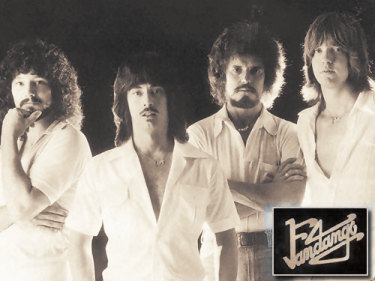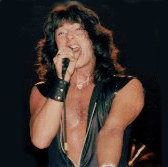


 |
|
Fandango - a moustachioed Joe (lookin' way like Carmine Appice! ;)) |
If the band's situation is that complicated, only a frontman effective enough may help some (think of The mighty Priest once again...). The record company pushed Joe into becoming one, which, needless to say, didn't exactly satisfy the other guys.
Unexpected as it may seem, Joe wasn't really keen on usurping the spotlight. Contrariwise, he had thought his voice was 'only OK even if he tried very hard'. He was forced to sing lead - by accident, when the singer in one of Joe's preceding bands fell ill. At that moment, Joe was stunned by the reaction of the audience who were impressed with his 'modest' singing abilities!
Anyway, in spite of all the band's efforts and Joe's handsome features, their luck seemed to have caught some mortal disease. Fandango played Chicago Fest, a big event in itself, and there their equipment worth around 80 or 90 thousand dollars got stolen. Jethro Tull and Billy Joel were also victims of the thieves, but as they were seasoned major performers, it wasn't as devastating for them as it was for Fandango. Devastating both financially and emotionally. That's when things went downhill for this undeservingly overlooked and forgotten band. Despite record company (RCA Records) trying to support the band, they broke up. Still, Joe remained great friends with Rick Blakemore.
After it was all over with Fandango, Joe tried to get a gig somewhere in NY. He was living in West Village at the time. Joe sought work as a background musician (guitar/backing vocals), but... he turned out to be too good for such a position, as every guy there up front (many of whom were, as Joe put it, 'some record company guy's nephews or something...') felt kinda jealous, you know... Imagine you fronting a band in which one of the hired hands was, to quote Joe once again, "looking good, singing good, playing good and throwing shapes and poses". So kick'im!
 This was when Joe's (in)famous now self-assurance began to develop. It started the moment he said to himself: "F*** it! I gotta be the lead guy to make it!"
This was when Joe's (in)famous now self-assurance began to develop. It started the moment he said to himself: "F*** it! I gotta be the lead guy to make it!"
Around the time he also caught... nope, not a mortal disease, but a mere cold. It seemed as well that his luck wasn't really ill anymore. Talk about the achievements in medicine. What am I talking about? Well...
Once Joe received a strange phone call. He was flooded with questions that made Joe suspect IRS was on his tail. Joe was getting kinda nervous, but suddenly the talk took an unexpected turn, when the caller said:
'Hang on, mate, Ritchie Blackmore wants to talk to you...'
Joe was astounded, to say the least. He was a long time Blackmore fan. Invitation to audition for Rainbow was something Joe could not even dream about.
He could not miss the chance and rushed over to Long Island where the audition was to take place. Joe was cursing himself for having caught a cold, but fortunately his vocal coach had shown him a technique to subdue this kind of trouble.
Rainbow guys took over the situation the moment Joe stepped into the studio. "Sing this", "Sing once more", "Improvise now", "Can you write lyrics?"
Joe did indeed improvise, lyrics included, and pulled the tasks off so impressively that he was immediately (if we can call a 6 hour audition - just around the time Dave Coverdale's audition took some years ago - an instantaneous acceptance) in. That's the lead vocalist gig for ya!..
Well, speaking about DC... different times and different demands. Just like DC, Joe was heavily influenced by the genius of Paul Rodgers, but Joe was kinda able to vary his sound. Ritchie wanted a 'pointed and clear' quality to the voice behind his Rainbow. Much like that of Lou Gramm's of Foreigner. Joe liked Foreigner well enough to take on a very Gramm-like persona for most of Rainbow's studio stuff. 'Jealous Lover' - a legendary b-side of an 1981 single that gained immense fan popularity - is one of the perfect examples of Joe "doing Lou".
 After having joined Rainbow, Joe had to put down
the guitar, tho. With this step opening new horisons for exploring new aspects of frontmanship, combined with Joe's cherubic appearance, one of the keys to the success of later day Rainbow was clearly defined.
After having joined Rainbow, Joe had to put down
the guitar, tho. With this step opening new horisons for exploring new aspects of frontmanship, combined with Joe's cherubic appearance, one of the keys to the success of later day Rainbow was clearly defined.
Diehard Rainbow followers were quite amused seeing this change, which Ritchie Blackmore, known for his unpretentious attitude and a typical belles-lettres style of speech, characterised as 'pansying'. Ritchie's indulgence turned out unprecedented as well: when he realised that the fans were not particularly happy with Joe's stage presence, he chose a very efficient and simple way to inform his lead singer of the necessity to alter his theatrics a little bit.
Let's hear Ritchie's own confession:
Backstage, I pulled him by the throat and told him, "You've got to stop the pansying. You're not Judy Garland".
Ritchie was probably not impressed with Rob Halford.
Anyway, discarding all the decidedly not obligatory extras like looks and grace of the new lead singer and the sexiness of his voice, what was left was absolutely indisputable: the vocal technique that the singer possessed and the impressive songwriting chops of his. 'I Surrender', after having undergone a slight Turnerification, soared right to No. 3 in the charts - for the first time in the entire history of Rainbow. This wasn't the one-hit wonder type of success: 'Stone Cold', 'Street of Dreams' etc became staples of AOR radio and are still played to this day on stations of this kind.
Well, AOR stands for album oriented rock, which was perfectly true as far as Rainbow were concerned: their albums still were selling better than the singles, and this was a somewhat obsolecent marketing strategy...
Who cared, anyway. While Rainbow promo videos were in MTV's heavy rotation (altho 'Street of Dreams' was banned from it for MTV only knows what reasons!..), and the shows were sold out, Ritchie was pleased. And Joe Lynn was pretty happy, wasn't he?
'LimoÆs, the magazines and the chicks! Sex, drugs and rock and roll! This is Spinal Tap!!'
Joe Lynn Turner, Classic Rock Revisited 1999 interview
Somewhere around this time Joe was voted one of the Best Asses in Rock'n'Roll (guess Kerrang! had quite a lot to do with this honourable election)
During his Rainbow years Joe striked a friendship with Stuart Smith, a talented English guitarist.
Overall, 1980-1984 could be described as JLT's dream come true.
Detailed history of Rainbow can be found elsewhere, see Rainbow Fan Clan for instance.

Text of this bio, compilation and interpretation of the facts, any opinions and conclusions found herein represent the personal standpoint of Funky Deuce and should be construed as results of her historical research.
In short, it's not an official bio.
Comments and questions: please direct them to Dream Chaser Team.